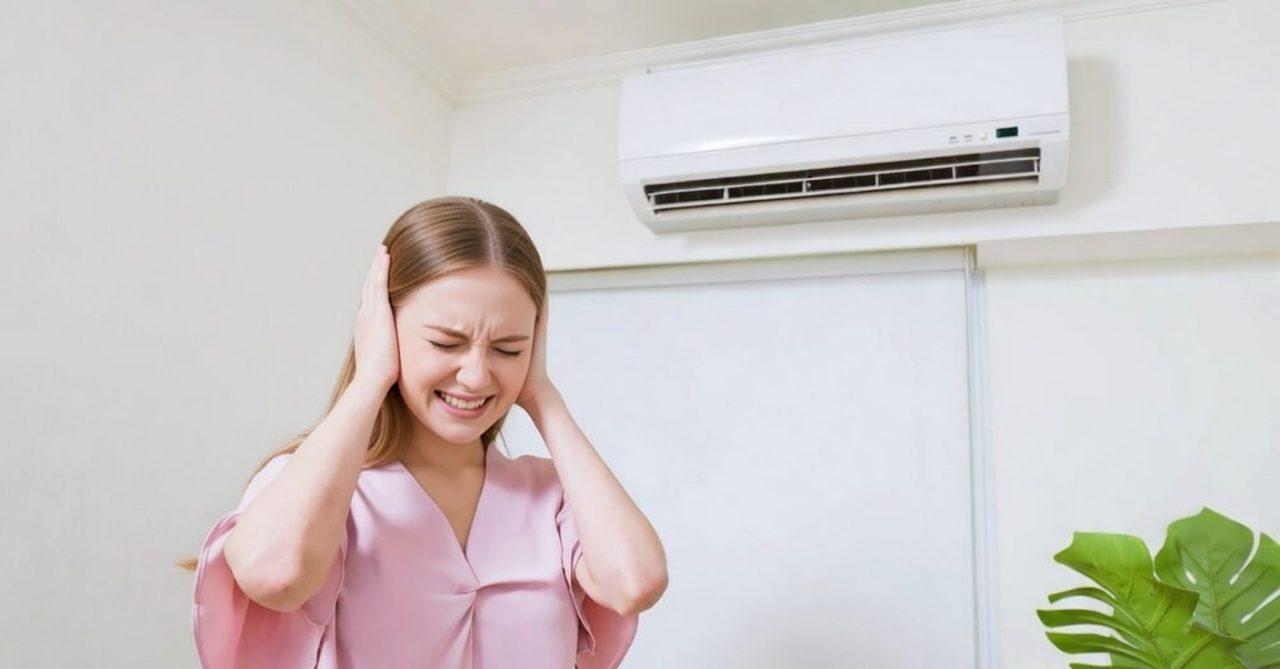
The simple answer to this question is yes – air conditioning can indeed cause sore throats. In this article, we’ll explore the steps you can take to avoid this issue, showing how throat irritation can be prevented when using AC. We’ll also highlight the importance of regular AC maintenance to ensure your system is operating efficiently and providing clean, healthy air.
So, let’s get started.
How Does Air Conditioning Cause Sore Throat?
Many people associate sore throats with common illnesses like colds or allergies, but air conditioning can sometimes irritate your throat, too. While it’s unlikely that air conditioning is the sole cause of the problem, it may aggravate your symptoms.
In this section, we’ll explore how air conditioning can impact your throat and the steps you can take to reduce discomfort and improve indoor air quality.
Let’s look at how and why the issue might occur:
Improper installation: Like stagnant water, stagnant air is an ideal breeding ground for bacteria. If your air conditioning unit is poorly installed, it could lead to bad air circulation in your home. This can result in dust accumulation, which attracts dust mites that may trigger allergy symptoms. Insufficient air circulation can also lead to the development of other respiratory conditions and viral infections. Therefore, proper installation is vital to ensure your air conditioner is operating efficiently and keeping your indoor air quality safe.
Dry air: Air with low humidity can irritate your throat and exacerbate allergy symptoms. In particular, cold, dry air can cause coughing, especially for asthma sufferers.
Stale air: One possible reason your air conditioning could be causing a sore throat is the presence of stale air. Like outdoor air, indoor air can become contaminated with pollutants such as chemicals, perfumes, or other airborne particles. These contaminants are not present in high enough concentrations to irritate your throat, but an air conditioning system can trap and concentrate these irritants, creating stale air that exacerbates throat discomfort. In some cases, air conditioners are positioned or designed in such a way that they circulate air in a specific area. This can result in a build-up of stale air in certain parts of a room or office. Additionally, when people close the outdoor vents to enhance cooling efficiency, the air can become stagnant and concentrate the pollutants, leading to throat irritation.
Dust and debris from air conditioner: While air conditioners’ filters are meant to remove dust and debris from the air, they can sometimes contribute to throat irritation if the filters or vents are not properly maintained. Over time, a dirty filter can release dust and debris particles back into the air rather than removing them. Dust can also accumulate in the vents of central air conditioning systems, or on the external unit and cooling fins, causing the system to blow contaminated air. This can lead to respiratory discomfort and a sore throat, particularly if the air isn’t properly filtered or cleaned.
Lack of maintenance: Regular cleaning of air filters and ducts is crucial for maintaining good air quality. Filters trap dirt and allergens, but over time they can become clogged with bacteria or mold if not cleaned regularly. In the next section, we will look at how to combat these issues and why having your air conditioner serviced twice a year can help ensure it’s operating at peak performance, reducing the risk of irritation and other health issues.
By keeping your air conditioner properly installed, well-maintained, and cycling in fresh air, you can mitigate the throat irritation that often comes with dry or contaminated indoor air.
How to prevent a sore throat when using air conditioning
Sore throats caused by air conditioning are often the result of poor installation, lack of maintenance, or improper use of the system. Here are some tips to help you avoid throat discomfort related to air conditioning:
Ensure proper installation: Proper installation is crucial for good air circulation. If the system is not installed correctly, air may not circulate effectively, leading to stale air. In some cases, you might need to improve airflow by opening windows or, in more severe cases, installing additional vents. Always ensure your air conditioner is installed by a qualified professional to avoid issues.
Keep up with regular maintenance: Regular air conditioning system maintenance is essential for avoiding many common issues that can lead to a sore throat. Keeping filters clean and ensuring the unit is free of dust and debris helps maintain healthy air quality and reduces the risk of bacterial growth or mold that could cause throat irritation.
Avoid overuse of the air conditioner: Running the air conditioner too much can make the air excessively cold and dry, contributing to throat dryness. To prevent this, adjust the thermostat to a more moderate temperature or turn the unit off for short periods to allow the air to return to a more comfortable humidity level. You can also use a humidifier to add moisture, but this may conflict with the air conditioner's cooling function.
Utilise the ventilation option: Many air conditioning systems have the ability to bring in fresh air from outside. While it’s common to close the outdoor vent to improve cooling efficiency, periodically allowing fresh air to circulate can help prevent the air from becoming too stale or dry.
Take breaks from air conditioning: Spending long periods in an air-conditioned environment can dry out your throat. If possible, take regular breaks and step outside to get some fresh air. This helps your throat recover from prolonged exposure to dry, cooled air.
Importance of regular AC maintenance
Regular air conditioning maintenance is key to ensuring good air quality and preventing sore throats. Here's how proper maintenance helps:
Solving the installation problem: Correct installation ensures proper air circulation. Poor installation can cause stale air, which may irritate your throat. Always have your system installed by a professional.
Avoiding the maintenance issue: Dirty filters and clogged vents can lead to dust, allergens, and bacteria in the air. Regularly cleaning your air conditioner prevents these irritants, reducing the risk of throat irritation.
The overuse problem: Excessive use of the AC can dry out the air, leading to throat discomfort. Regular maintenance helps keep the unit running efficiently, and adjusting the temperature helps maintain comfortable humidity levels.
Creating good ventilation: Many ACs allow fresh air from the outside, helping to prevent stale, dry air. Routine maintenance ensures proper ventilation, reducing the risk of throat irritation.
Take breaks from air conditioning: Prolonged exposure to AC can dry out your throat. Regular breaks and stepping outside for fresh air will help prevent dryness and discomfort.
Maintaining your air conditioning system ensures better air quality and comfort, keeping your throat and airways free from irritation.
About Daikin
Daikin is the global pioneer and leader in the HVAC and refrigeration industry, driving innovation and sustainability across an extensive product range, including air conditioning units, grills, chillers, VRV systems, air handling units (AHUs), fan coil units (FCUs), controls, pumps, and comprehensive service and parts support. Through this, Daikin meets and exceeds the needs of residential, commercial, and industrial applications.
At the core of our philosophy is the belief in the infinite potential of people – and we are constantly working towards a future where comfort and environmental responsibility coexist harmoniously. We are proud to employ over 98,000 people, operating in over 170 countries with a global network of 115 factories. By safeguarding the future of our planet’s air, we are committed to enhancing the environment for future generations. Contact Daikin today to learn more about our state-of-the-art air conditioning systems.



